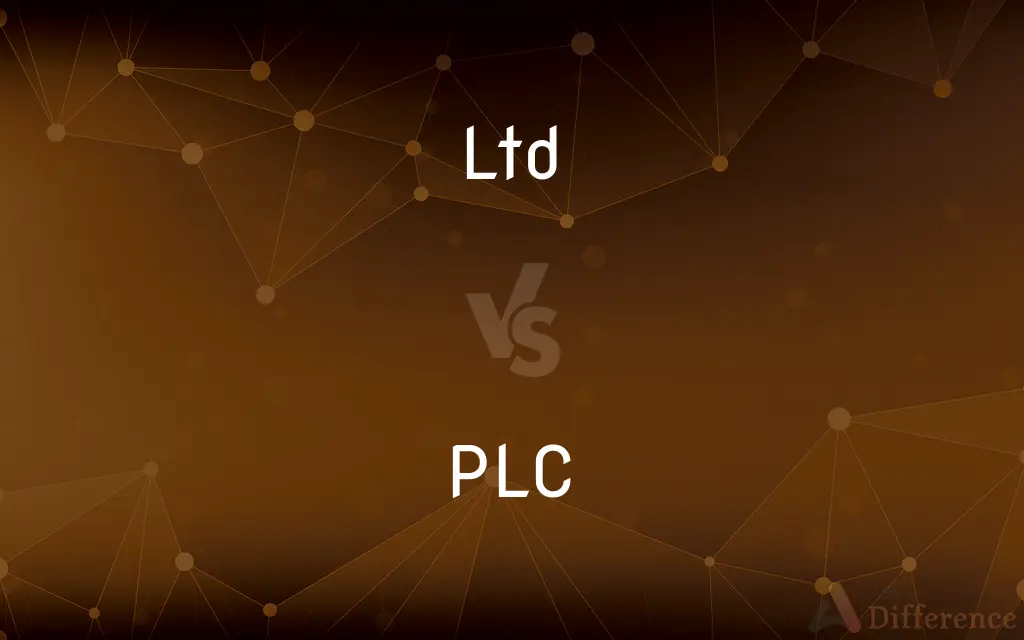Ltd vs. PLC — What's the Difference?
Edited by Tayyaba Rehman — By Urooj Arif — Published on March 8, 2024
Ltd is a business structure that offers limited liability to its shareholders and restricts public shares trading. PLC also provides limited liability but allows trading of its shares on public stock exchanges, catering to a broader shareholder base.

Difference Between Ltd and PLC
Table of Contents
ADVERTISEMENT
Key Differences
An Ltd, or Private Limited Company, is a business entity that offers limited liability to its shareholders, meaning their personal assets are protected from business debts. Share ownership in an Ltd is typically restricted to a small group, such as family members or private investors, and shares cannot be offered to the general public. This structure is popular among small to medium-sized businesses that prefer to keep their operations and financial affairs private.
A PLC, or Public Limited Company, in contrast, is designed for larger businesses that wish to raise capital by selling shares to the public. A PLC can list its shares on a public stock exchange, which facilitates broader investment and liquidity but also requires adherence to stringent regulatory standards and greater transparency. This includes detailed financial reporting and disclosure to shareholders and the public.
The transition from an Ltd to a PLC can be a strategic move for a company seeking expansion and increased capital through public investment. However, this transition involves significant preparation, legal compliance, and changes in governance structures to meet the regulatory requirements of public trading.
A key distinction between Ltds and PLCs lies in their share distribution and capital raising capabilities. Ltds often have a closer, more personal relationship with their shareholders, while PLCs must manage relationships with a potentially vast and fluctuating shareholder base. This difference reflects in their respective management and operational strategies, where Ltds may have more flexibility in decision-making, and PLCs adhere to stricter governance frameworks to protect public investor interests.
Moreover, the financial scrutiny and regulatory compliance for PLCs are much higher than for Ltds. PLCs are subject to regular audits, must publish annual reports, and are closely monitored by regulatory bodies to ensure transparency and fairness in the trading of their shares. This level of scrutiny aims to protect investors and maintain confidence in the financial markets.
ADVERTISEMENT
Comparison Chart
Share Trading
Shares cannot be sold to the general public.
Shares can be traded on public stock exchanges.
Shareholder Base
Typically smaller, private investors.
Potentially vast and includes general public investors.
Regulatory Requirements
Less stringent, with fewer disclosure obligations.
More stringent, with comprehensive disclosure and reporting requirements.
Capital Raising
Limited to private investments.
Can raise capital publicly through stock markets.
Liability
Limited liability for shareholders.
Limited liability for shareholders.
Transparency
Less transparency required.
High level of financial transparency and reporting required.
Governance
Can have more flexible governance structures.
Subject to strict corporate governance standards.
Audits and Reporting
Subject to fewer mandatory audits.
Must undergo regular audits and publish detailed financial reports.
Compare with Definitions
Ltd
A company structure offering limited liability, with private shareholding.
XYZ Technologies Ltd is a family-owned business.
PLC
Allows public trading of shares on stock exchanges with limited liability.
EFG Plc is listed on the London Stock Exchange.
Ltd
Shares are privately held and not publicly traded.
ABC Ltd's shares are owned by its founders and a select group of investors.
PLC
Capable of raising capital from the public market.
PQR Plc raised capital through a public offering to expand its operations.
Ltd
Suitable for small to medium-sized enterprises.
LMN Ltd operates a successful local retail chain.
PLC
Requires adherence to strict regulatory standards.
MNO Plc publishes its financial reports quarterly as per regulations.
Ltd
Less regulatory and financial reporting burden.
JKL Ltd enjoys the benefits of limited liability without the need for public disclosure.
PLC
Subject to greater public scrutiny and transparency.
STU Plc's financial health is closely monitored by investors and analysts.
Ltd
Offers flexibility in management and operations.
GHI Ltd quickly adapted its strategy based on shareholder input.
PLC
Operates under a strict governance framework.
VWX Plc's board of directors ensures compliance with corporate governance standards.
PLC
(business) public limited company
PLC
(electronics) programmable logic controller
Common Curiosities
What regulatory body oversees PLCs?
The regulatory body varies by country, such as the Securities and Exchange Commission (SEC) in the U.S. or the Financial Conduct Authority (FCA) in the U.K.
Why would a company choose to be an Ltd instead of a PLC?
Companies may prefer the Ltd structure for its privacy, fewer regulatory burdens, and to maintain control over share distribution.
How does a PLC raise capital?
A PLC raises capital by selling shares to the public on a stock exchange, which can be used for expansion, debt repayment, or other purposes.
Can an Ltd become a PLC?
Yes, an Ltd can transition to a PLC by meeting specific legal and financial criteria, including a minimum share capital and public share offering.
Are PLC shareholders liable for company debts?
Like Ltd shareholders, PLC shareholders have limited liability, meaning their personal assets are protected beyond their investment in shares.
Is financial information for an Ltd publicly available?
In many jurisdictions, Ltd companies must file accounts with a regulatory body, but the level of detail required is less than for PLCs.
Can anyone buy shares in a PLC?
Yes, any member of the public can buy shares in a PLC, subject to the availability of shares on the stock market.
Can a PLC be privately owned?
While a PLC's shares are publicly traded, it can have significant shareholders or a group that owns a large percentage of the shares, effectively controlling the company.
Do Ltd companies pay dividends?
Yes, Ltd companies can pay dividends to their shareholders, based on the company's profits and at the discretion of its directors.
What are the benefits of investing in a PLC?
Benefits include potential dividends, voting rights in certain company decisions, and the liquidity to buy or sell shares easily.
What happens if a PLC fails to meet regulatory requirements?
Failure to meet regulatory requirements can result in fines, legal action, and possible delisting from the stock exchange.
What are the tax implications for Ltd and PLC companies?
Tax implications vary by country but generally involve corporate tax on profits. The specific tax treatment can depend on the company's structure and earnings.
How does the decision-making process differ between an Ltd and a PLC?
In an Ltd, decisions can often be made quickly and with fewer formalities, while a PLC must consider the interests of a wider group of public shareholders, following formal procedures.
What is the minimum number of shareholders for an Ltd and a PLC?
This varies by jurisdiction, but typically, an Ltd can be formed with one shareholder, while a PLC might require at least two.
How does public perception differ between Ltd and PLC companies?
PLCs may be perceived as larger and more stable due to their ability to raise public capital and the regulatory oversight they are subject to, potentially affecting investor and consumer confidence.
Share Your Discovery

Previous Comparison
Social Marketing vs. Social Media Marketing
Next Comparison
Edwardian Houses vs. Victorian HousesAuthor Spotlight
Written by
Urooj ArifUrooj is a skilled content writer at Ask Difference, known for her exceptional ability to simplify complex topics into engaging and informative content. With a passion for research and a flair for clear, concise writing, she consistently delivers articles that resonate with our diverse audience.
Edited by
Tayyaba RehmanTayyaba Rehman is a distinguished writer, currently serving as a primary contributor to askdifference.com. As a researcher in semantics and etymology, Tayyaba's passion for the complexity of languages and their distinctions has found a perfect home on the platform. Tayyaba delves into the intricacies of language, distinguishing between commonly confused words and phrases, thereby providing clarity for readers worldwide.
















































